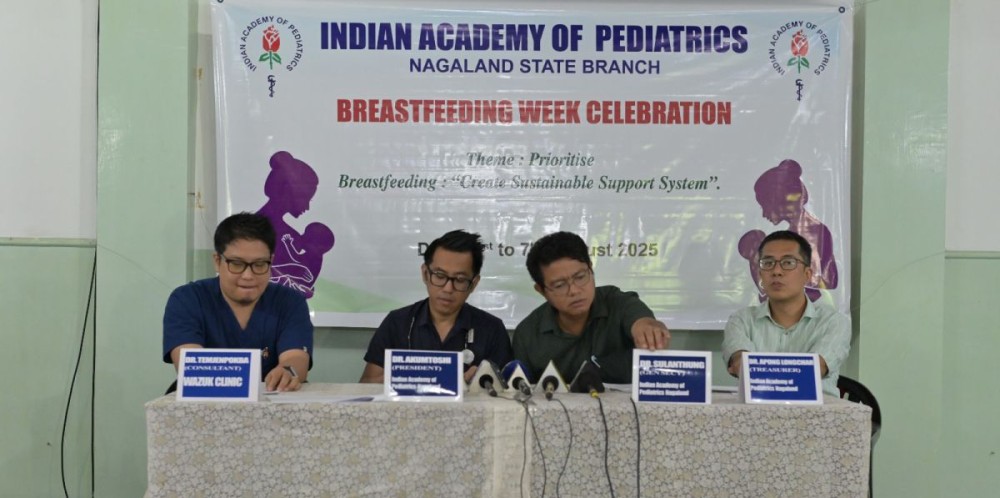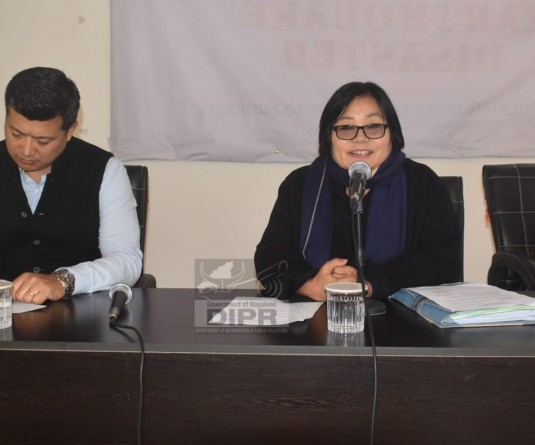Members of Indian Association of Paediatrics, Nagaland Chapter address a press conference at Zion Hospital Dimapur on August 7. (Morung Photo)

Morung Express News
Dimapur | August 7
Breastfeeding is considered customary across cultures, but misconceptions still persist, according to paediatricians. As per the UNICEF, only 54.9 percent of children receive exclusive breastfeeding for the first six months of life. While conclusive studies are lacking in Nagaland, the state chapter of the Indian Association of Paediatrics (IAP) said that clinical experiences point to the UNICEF data mirroring that of the situation in the state.
“Although 79 percent of deliveries in India happen in institutes (hospital setting), less than half (41.6 percent) of those initiate breastfeeding within the first one hour of life due to various reasons,” said Dr Sulanthang, a paediatrician, who is also the General Secretary of the IAP, Nagaland chapter.
The IAP Nagaland convened a press conference on August 7, at the Zion Hospital and Research Centre, Dimapur, coinciding with the World Breastfeeding Week, observed annually from August 1 to 7, with the objective of advocating improved breastfeeding support systems.
Dr Sulanthang attributed the concerning statistics to a combination of factors, including prevalent misconceptions about breastfeeding and a lack of adequate support. “Sometimes it can be due to structural problems in the system itself,” he explained, “by which I mean the setup in the place of delivery— like lack of awareness among the staff or just lack of privacy for the mother.” According to him, this year’s theme— ‘Prioritise Breastfeeding: Create Sustainable Support Systems’ reflects what is prevailing.
Dr Akumtoshi, President of IAP Nagaland underlined the numerous benefits for both mother and child and the need for creating lasting infrastructure to make breastfeeding accessible and practical for all mothers. He reiterated the WHO recommendation of exclusive breastfeeding for the first six months and continuing up to two years and beyond. “There is no harm in continuing beyond two years,” he said. He also noted that HIV-positive mothers with low or undetectable viral loads can safely breastfeed.
Dr Temjen Longkumer advised against feeding cow milk in the initial months after birth. “Milk is actually species specific as well as baby specific. By which, I mean, cow milk is for cows and human milk is for humans. The composition of each is completely different. And each mother's milk is tailored for her own baby,” he said. He maintained that breastmilk provides complete nutrition to the baby, aiding brain development, strengthening the immune system, and reducing the risk of long-term health problems.
For mothers, he said that breastfeeding aids physical recovery, reduces the risk of certain cancers, high blood pressure, heart disease, and type-2 diabetes, besides emotional bonding.
Dr Apong Longchar, IAP Nagaland Treasurer, addressed common misconceptions, clarifying that ‘colostrums’— the milk produced in the initial days after delivery, is sufficient, and that formula milk, while better than alternatives, cannot replace the benefits of breast milk. He stressed that breastfeeding, while natural, may require support, especially for first-time mothers. He also debunked the myth that mothers should stop breastfeeding after introducing solid foods.




